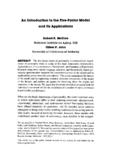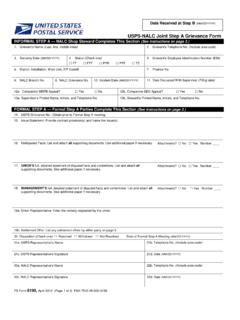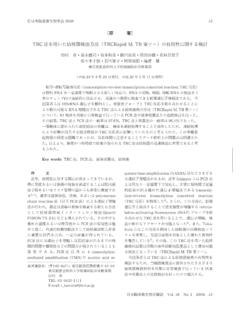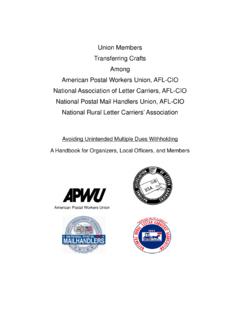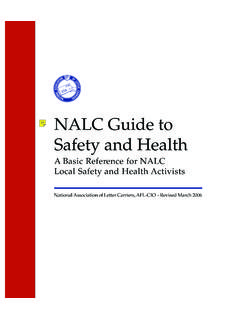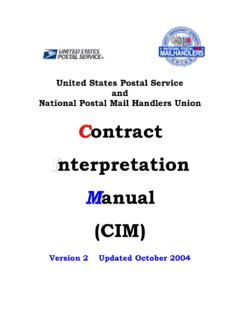Transcription of Postal Service Supervisor AND Manager Guilty of …
1 Postal Service Supervisor AND Manager Guilty of Abuse An Arbitration That Took A Stand Against Workplace Bullying As suggested in the BullyBusting Strategies section of our book, The Bully At Work, everyone should first hold employers accountable for faithfully enforcing their own lofty, noble internal feel-good, "respect for all" policies. Short of breaking a law, conscientious employers, who care about credibility with employees, expect to be held responsible for violating internal policies. However, the reality is that policies designed to restrain negative behavior are typically aimed at non-supervisory employees. "Violence prevention" means stopping employees from being violent, while ignoring daily psychological violence perpetrated by supervisors and their enabling managers who refuse to apply policies to themselves.
2 Obviously, the Postal Service thinks anti-violence policies do NOT apply to their managers. Of all governmental and quasi-governmental agencies, the Postal Service , more than any other should be intolerant of abusive misconduct by anyone since they spent $4 million to produce the fall 2000 Califano report on the unsafe workplace at USPS focusing on the role of physical violence there. The erroneous conclusion of that myopic report was to raise the salaries of managers to attract a better class of managers, ostensibly to improve the 1/20 chance employees will experience physical violence rather than to tackle the unfettered exposure of employees to verbal abuse (as illustrated below) that affects 1 in 3 USPS employees! Here is a real story about a federal arbitrator working in Wisconsin who stated the obvious about bullying in a Nov.
3 2000 ruling. Despite the Postal Service denials through all steps of a union grievance process, the courageous arbitrator punished the agency in a unique way that certainly provided the bullied letter carrier with a greater sense of justice achieved than most people who pursue legal remedies in court. (See Remedies below) The ruling described below should give hope to all bullied individuals and unions who feel hopeless facing down bully managers armed with nothing more than agency policies. Bullying is part of the Anti-Violence Policy upon which this grievance was based and the term is used throughout the arbitration Decision and Award document, as part of the Arbitrator's own language. G. Namie Workplace Bullying Institute Date of grievable action (single incident): December 1998 Relevant Contract Provision: 1992 Joint Statement on Violence and Behavior in the Workplace (an anti-violence policy) The Grievant letter carrier was represented by his union, the National Association of Letter Carriers (NALC) Arbitrator: Bernice L.
4 Fields Place of Hearing: Milwaukee, Wisconsin Date of Hearing: October 12, 2000 Date of Award: November 1, 2000 The arbitration questions considered were: 1. Did the USPS Supervisor bully, intimidate, threaten, or was abusive to the letter carrier as per the joint anti-violence statement signed by management and the union? 2. What is the remedy? Incident Description and Positions of the Parties Supervisors Can Be Disciplined Arbitrator's Understanding of Psychological Violence Power Imbalance and Employer Liability Extraordinary Remedies Ordered The following text was adapted by WBI from the original Decision and Award document written by Bernice L. Fields, Arbitrator. Significant statements have been excerpted directly (and contained in quotations) to demonstrate the arbitrator's reasoning in her own words.
5 A privacy agreement exists between the Regional NALC and the USPS that prohibits the disclosure of names of the parties. WBTI has also deleted references the specific Post Office, the site of the incident. Despite the positive outcome, please note that this grievance dragged on for nearly two-years. This is because Postal management resisted the union's bid "to rid itself of managers it perceives as a stumbling block to conducting business as the Union sees " As with all bullying, it's always a battle over control -- managerial prerogative vs an individual's right to dignity at work. Case Background and Arguments by Union and Management The Grievant (a male letter carrier) was delivering mail on a late Dec. afternoon in Wisconsin when it became so dark he could not see well enough to finish the route.
6 After tripping and being unable to find mailboxes, he called the Post Office to request permission to stop deiivering mail to say it was unsafe to continue. He only got a busy signal. When he returned to his vehicle, a customer wanted mail he believed the Grievant had, but since the customer did not have identification and was unknown to him, the Grievant would not give the mail to the customer. The customer became irate and the Grievant got in his vehicle and left the scene. The customer tailgated Grievant's vehicle back to the Post Office. The customer complained to the letter carrier's Supervisor (a male). The Supervisor approached the Grievant in anger waiving his arms aggressively, and yelling. Witnesses testified that the Supervisor called the Grievant "unprofessional" for returning mail and not calling in.
7 When Grievant tried to tell of his attempt to call, the Supervisor yelled that he was a liar. The carrier was also accused of almost running down the customer. Grievant called the customer a liar. Still yelling, the Supervisor called the Grievant a liar several more times, appearing "out of control" to several witnesses. The Supervisor testified that he was not in the least upset when he went to the workroom floor to investigate the customer's complaint that Grievant had almost hit the customer with the vehicle. He says that when Grievant called the customer a liar, he, the Supervisor , said in a normal tone of voice, " if the customer is proved correct, then you will be the liar." He denied yelling or flailing his arms, or being out of control.
8 The Supervisor admitted to other employees complaints about his behavior in the recent past. He had used profanity when directing employees, had lost his temper before on the workplace floor, had been required to apologize to employees for his behavior, and that he had received remedial supervisory training as a result on another employee complaint. Other witnesses, including the Supervisor 's Manager , testified that there were a series of complaints about the Supervisor 's treatment of other letter carriers, including one case settled with a monetary award to the employee. The union filed the grievance against the Supervisor for violations of the anti-violence policy and under the collective bargaining ageement. The employer denied the grievance at all levels on the grounds that the behavior of the Supervisor did not rise to the level of a vioiation of the anti-violence policy.
9 Postal management alleged that there was no intent on the Supervisor 's part to bully, harass, or intimidate Grievant. The Supervisor 's Manager and the Postal Service argued that such exchanges occur daily on the workroom floor between supervisors and employees in the largest facility in the city. They said the exchanges do not rise to level of violations of the anti-violence policy because there were no direct threats of violence. Further, the union steward in whose presence the incident occurred took no immediate action, did not call the police, the Postal Inspectors, or file an immediate grievance. Management argued that the grievance was an attempt by the union "to rid itself of managers it perceives as a stumbling block to conducting " In addition, management said that arbitrators have no authority to discipline supervisors since such action is specifically excluded in their contract with the union.
10 The union sought removal of the Supervisor . It believed that the Supervisor 's demonstrated pattern and practice of abusive behavior toward employees violated mutual respect and workplace dignity mandated by the anti-violence policy. Supervisors CAN Be Disciplined Arbitrator Bernice Fields found that Post Office Arbitrators have the authority to discipline supervisors. Arbitrator Fields , citing a national case with Arbitrator Snow, "arbitrators have available to them the flexibility found in arbitral jurisprudence when it comes to formulating remedies, including removing a Supervisor from his or her administrative duties." The Snow decision said that if management can use the anti-violence policy to discipline violent workers, then the contract principle of mutuality of remedies provides that workers have the same right.

